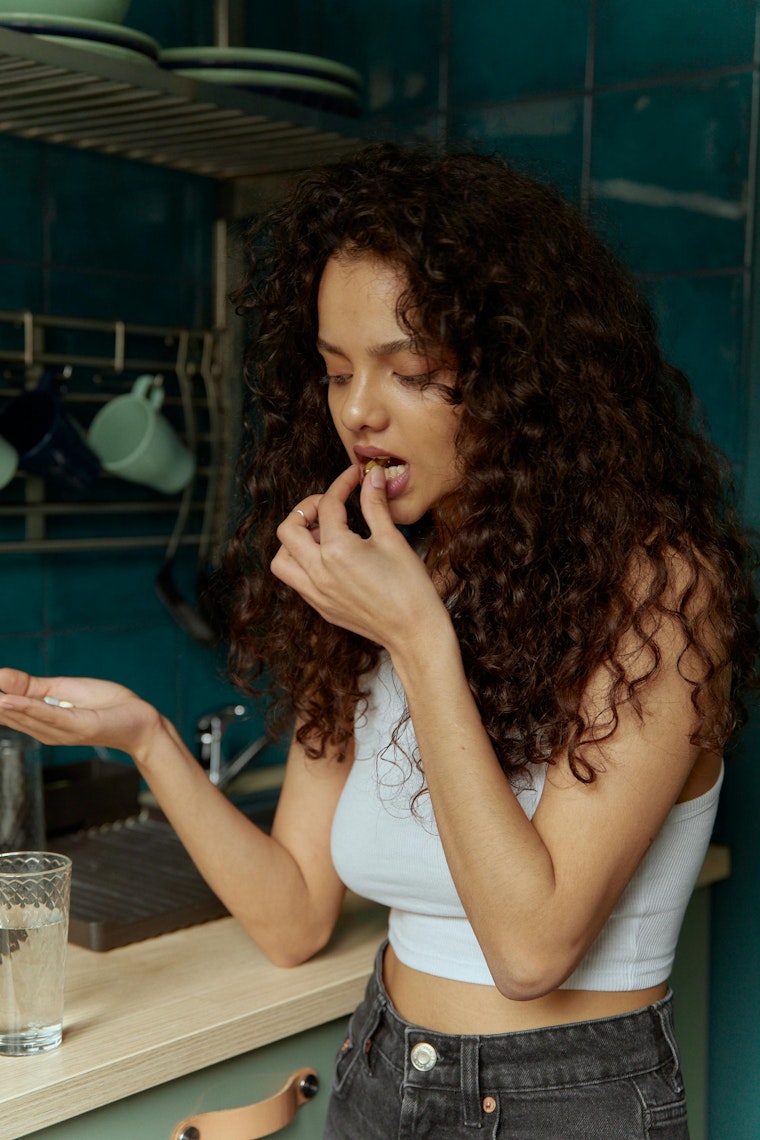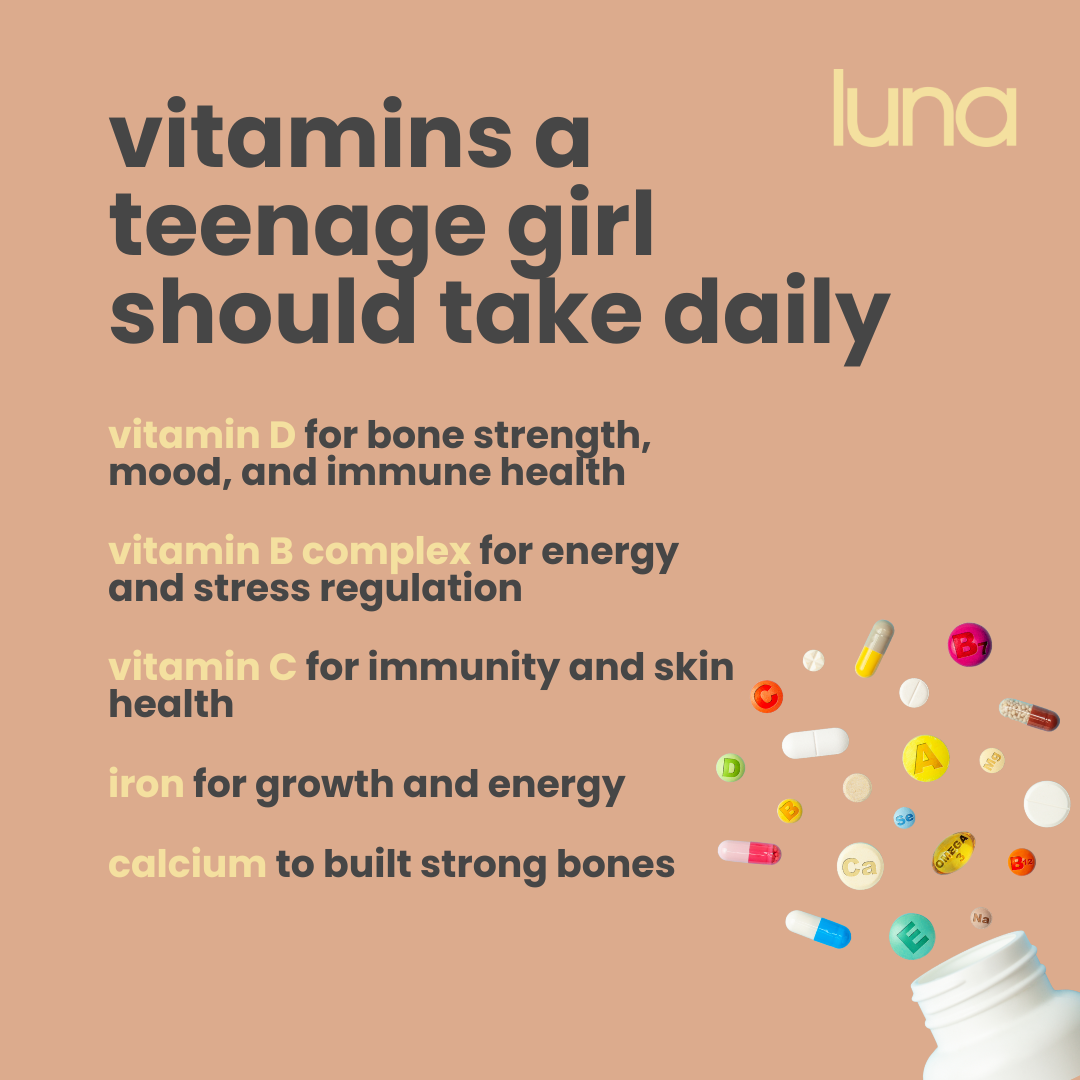What vitamins should a teenage girl take daily?
Understand your teen’s daily nutrition needs

Updated December 2, 2025 • Medically reviewed by Dr. Katie Knight
Medically reviewed by Dr. Katie KnightIn this article
- Quick summary
- Why vitamins for teenagers are important
- What vitamins should a teenage girl take daily?
- Best multivitamins for teenage girls
- Best supplements for teenage growth
- Supplements for teens: safety tips for parents
- How to encourage healthy habits alongside supplements
- Building healthy habits for lifelong wellbeing
Quick summary
- Teens go through major growth and hormonal changes that increase their nutrient needs
- A balanced diet should always come first, but vitamins can help fill common nutritional gaps
- The right supplements can support energy, mood, focus, and healthy development – when used safely

If you’re wondering whether your daughter's diet gives her everything she needs, you’re not alone.
Between busy school days, after-school snacks, and the occasional skipped breakfast, even the most well-meaning teen can miss out on key nutrients.
Adolescence is a time of rapid growth – physically, mentally, and emotionally – and that means your teen’s body needs a steady supply of vitamins and minerals to keep up.
So, luna's here to break down what vitamins teenage girls commonly need most and explore how to choose safe supplements if needed.
Let’s dive in!
Why vitamins for teenagers are important
Teenagers are growing fast, sometimes faster than their appetite or schedule can keep up with.
A balanced diet should always be the foundation, but vitamins can help fill in the gaps when life gets hectic.
The right nutrients can support:
- Energy and focus during long school days
- Mood balance through hormonal ups and downs
- Healthy skin and hair
- Strong bones and muscles during peak growth years
Supplements aren’t there to replace a healthy diet though, they’re about giving your teen’s body a bit of extra support when it needs it.
What vitamins should a teenage girl take daily?
It can feel like there’s a vitamin for everything, and those jam-packed supplement aisles don't make it easy!
But focusing on the essentials keeps things simple and effective.
Most teen girls benefit from:
- Vitamin D: supports bone strength, mood, and immune health; Vitamin D is especially important in people with darker skin, and those who don’t get much sunlight exposure (so, pretty much everyone in the UK during winter!)
- Vitamin B complex: helps turn food into energy and supports the nervous system
- Vitamin C: strengthens the immune system and promotes healthy skin
- Iron: prevents fatigue and supports growth (especially important for teens who menstruate)
- Calcium: builds strong bones and teeth during crucial growth years
But so long as these are being provided as part of a healthy diet, they aren't needed.
If you are picking vitamins for a teen, always check dosage labels and choose supplements designed for teenagers as adult doses can be too high.

Best multivitamins for teenage girls
Not every teen needs a multivitamin, but it can be helpful if your daughter:
- Is a picky eater or skips meals
- Follows a vegetarian or restrictive diet e.g. vegan
- Feels low on energy or often seems run down
- Has particularly heavy periods
When choosing one, look for:
- A teen-specific formulation that includes iron, calcium, folate, and vitamin D
- Sugar-free options like chewable tablets or gummies
- Products that are third-party tested for quality and safety
But please check in with your teen’s doctor before starting any new supplement as they can recommend what’s most appropriate for their needs.
Best supplements for teenage growth
Beyond vitamins, certain nutrients can further support your teen’s physical and mental development:
- Omega-3 fatty acids (fish oil or algae oil): support brain health, focus, and emotional balance
- Zinc and magnesium: aid in muscle recovery, bone health, and sleep quality
- Probiotics: promote healthy digestion and immunity, especially after illness or antibiotic use
Think of these as boosters, not replacements.
Supplements can enhance a good diet, but they can’t make up for skipping meals or missing out on fruits and vegetables.
So ensuring these are included as part of their daily diet is usually the best course of action, unless recommended by their doctor in the form of a supplement.
Supplements for teens: safety tips for parents
Before you restock the vitamin shelf, take a moment to make sure you’re choosing products that genuinely fit your teen’s needs.
With so many colourful gummies and “energy boosters” out there, it’s easy to assume all vitamins are harmless – but when it comes to teens, a little extra care goes a long way:
- Always check labels to make sure the dosage matches your teen’s age group
- Avoid megadoses or overlapping supplements (for example, taking more than one “multivitamin” product containing some of the same vitamins)
- Store vitamins safely, just like any other medication, to prevent accidental overuse – the label will instruct you on how best to do this
- Make sure your teen knows that vitamins are medicines – taking extra just because they taste nice (which can happen with gummies) can lead to harm
- Talk to your teen’s doctor or a pharmacist before introducing or mixing supplements in
How to encourage healthy habits alongside supplements
Vitamins are great support tools, but healthy habits make the biggest difference long-term.
To help your teen build a strong foundation, try to:
- Encourage balanced meals with a mix of colour, texture, and flavour
- Remind them to stay hydrated – they need 6-8 glasses of water daily
- Encourage good sleep habits – they need 8-10 hours a night
- Model what healthy looks like, and eat together when you can
- Keep conversations about nutrition positive – focus on how food makes them feel strong and energised, not how they look
The goal is to make health a team effort and something fun and sustainable, not a lecture or intense practise. Always remember that supplements are there to support, not perfect.
Building healthy habits for lifelong wellbeing
Most teens can meet their needs with balanced eating and a simple, age-appropriate multivitamin if needed.
Before starting any supplement, it’s always wise to consult your doctor, a pharmacist or a registered dietitian.
They can check for deficiencies and tailor advice to your teen’s health and lifestyle.
Healthy habits built today – from good nutrition to self-care – set the foundation for lifelong wellbeing.

How we created this article:
luna's team of experts comprises GPs, Dermatologists, Safeguarding Leads and Junior Doctors as well as Medical Students with specialised interests in paediatric care, mental health and gynaecology. All articles are created by experts, and reviewed by a member of luna's senior review team.
Sources:
NHS "Vitamins for children" | Accessed 30.10.25
https://www.nhs.uk/baby/weaning-and-feeding/vitamins-for-children/NHS "Vitamins and minerals" | Accessed 30.10.25
https://www.nhs.uk/conditions/vitamins-and-minerals/We'd love to keep in touch!
Sign up to our parent newsletter for emails on the latest teen trends, insights into our luna community and to keep up to date
By signing up, you are agreeing that we can use your email address to market to you. You can unsubscribe from marketing emails at any time by using the link in our emails. For more information, please review our privacy statement.